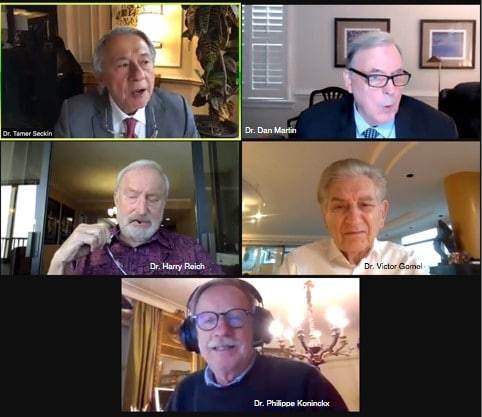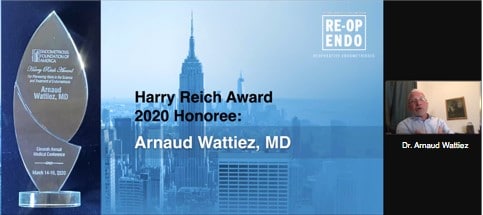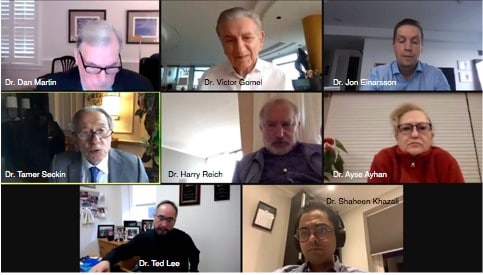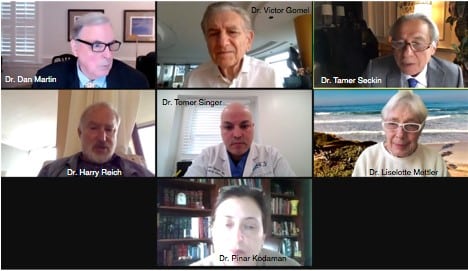Highlights From EndoFound’s Virtual Medical Conference 2020

This year, EndoFound‘s Virtual Medical Conference was held solely online due to COVID-19 restrictions. The conference was titled “Reoperative Endometriosis.” It featured 23 sessions, 22 speakers, and 1,000 attendees from around the world. All presentations are available to watch online on the EndoFound website. The conference also featured a live Q& A session spanning over two days from January 16 to 17, 2020.
The first day of EndoFound’s Virtual Medical Conference
The first day of the virtual conference consisted of three sessions: uterus, extrapelvic endometriosis and cancer, and neuropathy and peritoneal endometriosis; each joined by a panel of experts in their field.
Dr. Tamer Seckin, the Founder and President of EndoFound and an endometriosis surgeon at Lenox Hill Hospital in New York, welcomed everybody to the conference and introduced the speakers on the first panel: Dr. Harry Reich, Honorary Medical Director Emeritus and Senior Medical Advisor to EndoFound, Dr. Philippe Koninckx, Research Director at Latiffa Hospital in Dubai and Professor of obstetrics and gynecology in Leuven and Rome, and Dr. Errico Zupi, Associate Professor in the Department of Obstetrics and Gynecology at the University of Rome “Tor Vergata” in Italy. Dr. Zupi was, unfortunately, unable to join the online Q&A, but his presentations are available on the EndoFound website.

Each speaker then gave an overview of their online lecture starting with Dr. Reich and followed by Dr. Koninckx.
Dr. Reich’s presentation
Dr. Reich stressed that in the past, endometriosis surgery was more aggressive towards the rectum, potentially causing complications such as perforations of the rectum. Today, “we must be better trained and become pelvic surgeons,” Dr. Reich said.
Dr. Koninckx’s presentation
Dr. Koninckx explained that the definition of endometriosis is 100 years old and is not valid anymore. He added that endometriosis can cause changes in the peritoneal fluid or the fluid that covers the organs in the abdominal cavity driven by oxidative stress and infections. To prevent endometriosis, Dr. Koninckx said that pollution and oxidative stress must be reduced and that the peritoneal microbiome must be controlled with food and exercise. In closure, Dr. Koninckx said that endometriosis surgery in the future must be “much less aggressive than what we are used to.”
The session was followed by a live Q&A moderated by Dr. Harry Reich, Dr. Dan Martin, EndoFound Scientific and Medical Director, and Dr. Victor Gomel, Professor Emeritus in the Department of Obstetrics and Gynecology, University of British Columbia.
The second session of the day
For the second session of the day, Dr. Togas Tulandi, an endoscopic surgeon specializing in reproductive endocrinology and infertility, and Dr. Farr Nezhat, an Adjunct Professor of Obstetrics, Gynecology, and Reproductive Medicine at the School of Medicine at Stony Brook University, joined the online conference.

Dr. Tulandi discussed the large epidemiological study, which he conducted with the team, that examines the relationship between endometriosis, tubal cancer, and adenomyosis. The team found that all these conditions were associated with each other. He said that the incidence of ovarian cancer is low (around 1 in 10,000 women) but that it is slightly higher in women with endometriosis. “Endometriosis patients get cancer earlier but their prognosis is better,” Dr. Tulandi said.
Dr. Nezhat then took over and talked about the treatment and screening options for women with endometriosis. He discussed two main issues: genetic alterations that patients may have, and the difference in the histology of the lesions between endometriomas and malignant tissues. Those with germline molecular alterations in the BRCA1 and BRCA2 gene and genes associated with Lynch syndrome have a higher risk of ovarian cancer, Dr. Nezhat said, and he added that women with a family history of ovarian cancer should undergo genetic testing. If there are any genetic alterations they should be consulted and may need to undergo oophorectomy (or removal of the ovaries), especially if they are age 40-45 and already have children, he added.

Following the Q&A of this session, Dr. Seckin introduced Dr. Arnaud Wattiez, the Honoree of the Harry Reich Award for pioneering work in the science and treatment of endometriosis.
Dr. Wattiez’s keynote lecture
The online conference continued with Dr. Wattiez’s keynote lecture titled “Excision Without Mutilation: It’s Possible,” Following his lecture, Dr. Wattiez emphasized the importance of respecting patients’ objectives, which can sometimes be difficult to realize. He gave the example of a 43-year-old patient needing a hysterectomy and oophorectomy who did not want to go ahead with the procedures. Dr. Wattiez added that early diagnosis is key to prevent the growth of disease without the need for surgery. “The problem is not the disease itself, but the reaction of human tissue to it,” he said.
The third session of the day
The third and last session of the day included lectures from three specialists.
Dr. Marc Possover, the director of Possover International Medical Center in Zurich, Switzerland, emphasized the possibility of persistent pelvic pain following surgery due to nerve damage and the importance of listening to the patient.
Dr. Taner Usta, a professor of Obstetrics and Gynecology and the President of the Turkish Endometriosis & Adenomyosis Society, described four cases of nerve entrapment as a cause of pelvic pain in his presentation entitled “Exploring Pelvic Pain: Deep to Ischial Spine Including Pre-Sacral Roots.”
Finally, Dr. Ie-Ming Shih, Richard TeLinde Distinguished Professor of Gynecologic Pathology at the Johns Hopkins University School of Medicine, who was able to join the live conference and answer questions, discussed peritoneal endometriosis and adenomyosis. He described the team’s work that focuses on a genetic and epigenetic analysis of endometriosis and said that they are hoping to identify genetic and epigenetic biomarkers of endometriosis that can predict disease risk long before symptoms become apparent.
The second day of EndoFound’s Virtual Medical Conference
On the second day of the conference, Dr. Seckin and the moderators were joined by the deep endometriosis panel and fertility panel.

The deep endometriosis session
For the deep endometriosis session, Dr. Jon Einarsson, the Director of the Division of Minimally Invasive Gynecologic Surgery at Brigham and Women’s Hospital and a professor of Obstetrics, Gynecology and Reproductive Biology at Harvard Medical School, talked about how to avoid complications in endometriosis surgery and emphasized the importance of having an experienced surgeon to carry out the operation. “If you cannot manage complications yourself, you shouldn’t do the surgery yourself either,” Dr. Einarsson said.
Dr. Shaheen Khazali, an endometriosis surgeon based in London and Surrey, England, said it’s all about the patient, and added that a multidisciplinary team is not a few specialists getting together; they also have to “sing from the same hymn sheet.” He emphasized that it is very important all specialists see the patient before and after the surgery and understand why they are doing what they are doing. He gave the example of an Iranian colleague of his who was a urologist but not a laparoscopic surgeon. “I was his robot after a while,” Dr. Khazali said, “because he had seen the patient and understood the disease.”
Dr. Ted Lee, the Director of Minimally Invasive Gynecologic Surgery of University of Pittsburgh Medical Center at Magee Women’s Hospital, added that anticipation is key to allow the multidisciplinary team to work well together.
All panel members agreed that it is important to have a structured approach, guidelines, and specialized centers for endometriosis care.
Then, Dr. Dan Martin gave an overview of his presentation “Persistent Endometriosis, Recurrent Endometriosis, or Other Pain,” and stated that it is very difficult to tell whether pain after endometriosis surgery is due to incomplete surgery or disease recurrence.
The panel then touched on the politics involved in diagnosis and reimbursement policies by insurance companies.
Dr. Gomel’s keynote lecture
The live conference also included Dr. Gomel’s keynote lecture entitled “Adolescent Endometriosis Timely Detection.” Dr. Gomel stated that a young girl with pain must be investigated totally and that if endometriosis is apparent during laparoscopy it should be removed by an expert.
The fertility panel consisted of Dr. Liselotte Mettler from Universitätsklinikum Schleswig in Holstein Germany, Dr. Tomer Singer of Shady Grove Fertility in New York, Dr. Pinar Kodaman from Yale Reproductive Endocrinology and Infertility, Dr. Jovana Lekovich of RMA New York, and Dr. Errico Zupi from the University of Sienna in Italy.

Dr. Mettler said that their aim was to be helpful to their patients by doing less especially in the case of endometriomas. Dr. Singer stressed the importance of endometriosis surgeons and reproductive endocrinologists working together. Finally, Dr. Kodaman summarized the main points of her talk on tailored IVF protocols for endometriosis patients.
The conference came to a close with Margaret Caspler Cianci, the Executive Director of Endofound, thanking all participants and reminding everyone that the Global Virtual Patient and Medical Conference VirtualEndo24 will be taking place online in March 20 & 21, 2021.
Get a Second Opinion
Our endometriosis specialists are dedicated to providing patients with expert care. Whether you have been diagnosed or are looking to find a doctor, they are ready to help.Our office is located on 872 Fifth Avenue New York, NY 10065.
You may call us at (646) 960-3080 or have your case reviewed by clicking here.